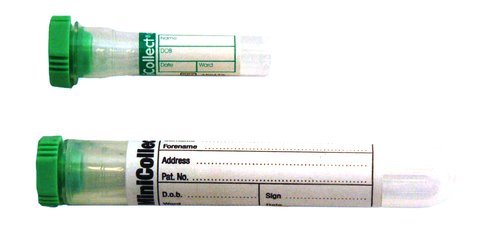Bicarbonate (HCO3, CO2)
Chemical Pathology
Notes
Carbon dioxide in the blood is mainly a by-product of metabolism. Bicarbonate is a major form of this, being a negatively charged ion which is excreted and reabsorbed by the kidneys. This helps maintain the body's acid-base balance. Bicarbonate also works with the other electrolytes (sodium, potassium, and chloride) to maintain electrical neutrality at the cellular level.
Determination of bicarbonate can be useful in the investigation of acid-base status although assessment is often done by blood gas analysis.
Bicarbonate is decreased in metabolic acidosis (e.g. diabetic ketoacidosis) and in compensated respiratory alkalosis, but increased in metabolic alkalosis and in compensated respiratory acidosis.
Artefactual decrease in bicarbonate can occur when samples are delayed in transit or are of small volume (due to loss of carbon dioxide into the atmosphere).
Sample requirements
For adults, blood taken into a 5mL gold top tube (rust top for Acute Unit)

For children, blood taken into a 3.5mL rust top tube

For neonates, blood taken into a 0.8mL minicollect lithium heparin tube. Please list the tests of particular interest so that some priority can be given to analysis if plasma volumes are small.

Storage/transport
Do not store. Send as soon as possible to the laboratory at ambient temperature (within 8 hours maximum)
Required information
Relevant clinical details.
Turnaround times
- The assays are run throughout the day and night.
- The in-lab turnaround time is normally less than 24 hours.
- The test can be ordered as an urgent request.
Reference ranges
22–29 mmol/L
Further information
To learn more about bicarbonate visit Lab Tests Online
Page last updated 05/06/2018